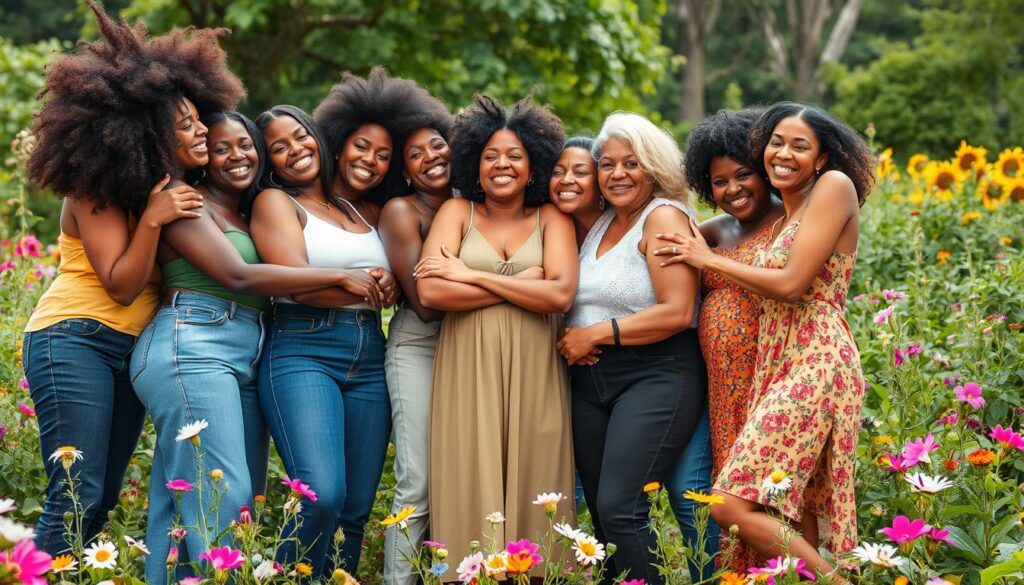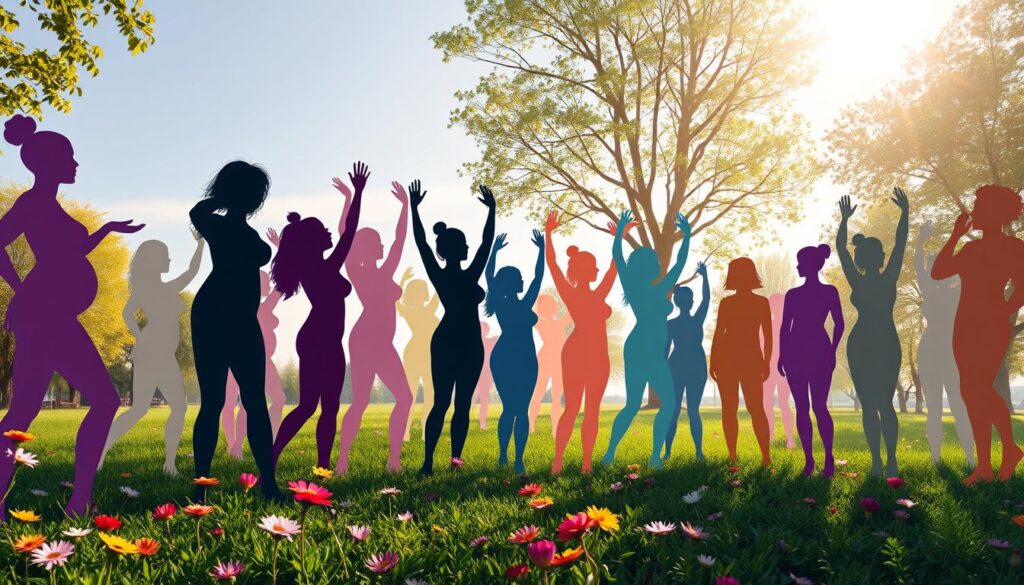In a world full of unrealistic beauty standards, finding body positivity and self-love can seem hard. Yet, embracing your unique beauty and celebrating your body’s strength is very rewarding. This journey needs patience, kindness, and a strong will to fight against society’s pressures.
Body positivity is more than a trend; it’s a strong movement against narrow beauty standards. It helps us build a healthy relationship with our bodies. This way, we find self-acceptance, self-worth, and peace. It’s not about being perfect, but loving our imperfections and celebrating our body’s strength and diversity.
Key Takeaways
- Body positivity is a transformative journey that requires self-love and perseverance.
- Embracing our unique beauty and celebrating body diversity is crucial for true self-acceptance.
- Challenging societal pressures and unrealistic beauty standards is essential in this journey.
- Nurturing a healthy relationship with our bodies is the key to unlocking inner peace and self-worth.
- The path to self-love is not about perfection, but rather, about recognizing the strength and resilience of our physical forms.
Understanding the Impact of Societal Beauty Standards
Societal beauty standards deeply affect how we see ourselves. The media shapes these ideals, showing us what’s beautiful. It often shows only one kind of beauty.
We see these images from a young age. They tell us how we should look. This makes us feel bad about ourselves and want a perfect body.
The Role of Media in Shaping Body Image
A 2017 Dove Self-Esteem Project survey found something important. It said 5 in 10 young girls feel a lot of pressure to look beautiful. And 6 in 10 feel pressure to always look acceptable.
The survey also showed that 70% of young girls think beauty is too important. They think it defines happiness for girls too much.
Breaking Free from Unrealistic Expectations
It’s key to break free from these expectations. This helps us feel body confidence and accept inclusive beauty standards. We need to challenge society, celebrate diversity, and see the beauty in everyone.
Cultural Influences on Self-Perception
Culture also shapes how we see ourselves and others. Our upbringing, values, and community comments affect us. It’s vital to understand these influences and build a positive body image.
“6 in 10 young females globally have chosen not to attend social engagements or be assertive in their opinions because of low self-esteem.”
Beating societal beauty standards needs a big effort. We must challenge the media, embrace diversity, and support self-love and acceptance.
The Science Behind Self-Image and Mental Health
Your body image and mental health are closely linked. Learning about this connection can help you appreciate your body more. A bad body image can cause anxiety and depression. But, a good self-image can make you feel better overall.
Girls and boys often feel unhappy with their bodies. Girls are more likely to feel this way, but boys do too. This feeling can last a long time, as shown in a 2019 study. LGBTQIA+ people might feel even more stressed about their bodies.
Being very overweight can really affect your mind. A study found that body image and mental health are closely related. Obesity can make you feel sad, alone, and lose confidence.
| Statistic | Value |
|---|---|
| Prevalence of overweight and obesity worldwide | More than 1.9 billion people suffer from overweight and 600 million from obesity |
| Prevalence of overweight, obesity, and morbid obesity in Iran | 28.60%, 10.80%, and 3.40% respectively |
| Relationship between body image and psychological well-being in morbid obese patients | Significant relationship (r=0.43, P |
Understanding the deep impact of body image is key. Doing physical activities and getting help from therapy can help. These steps can improve how you see yourself and feel better mentally.
On your journey to self-acceptance, remember you are more than your looks. Love your body’s uniqueness and care for your mental health. With kindness and strength, you can build a positive self-image that lets you live a happy life.
Discovering Body Positivity: A Path to Self-Acceptance
Body positivity is a journey to love and accept yourself. It’s about fighting against unfair views in ads, social media, and more. It’s about seeing all bodies as valuable, no matter their shape or size.
Key Principles of the Body Positive Movement
The body positive movement is all about self-acceptance and being inclusive. It says all bodies are good, no matter how they look. It fights against bad beauty standards and diet culture.
Historical Evolution of Body Acceptance
The body positivity movement started in the 1960s and 1970s. Events like the “fat-in” protest in 1967 were key. Groups like The National Association to Advance Fat Acceptance helped challenge society.
Modern Perspectives on Size Diversity
Today, body positivity is more about accepting all body types. It’s not just about weight. It’s about seeing beauty in every body.
Learning about body positivity can change your life. It helps you accept and love yourself. You’ll feel more confident and happy with who you are.
| Key Principles of Body Positivity | Benefits of Embracing Body Positivity |
|---|---|
|
|
“Body positivity is not about being perfect – it’s about being at peace with the skin you’re in.”
By embracing body positivity, you start a journey of self-acceptance. You learn to love yourself and live a more fulfilling life.
Transforming Negative Self-Talk into Self-Compassion
On your journey to body positivity, a key step is changing negative self-talk to self-compassion. Negative self-talk hurts your body image and self-esteem. But, self-compassion helps you be kinder to yourself.
Self-compassion means being kind to yourself. It’s about seeing you as part of humanity and being gentle with your feelings. This way, you can stop being too hard on yourself.
Positive affirmations are a great way to start. Saying nice things about yourself changes your mind. Being thankful for what your body can do also helps you feel better about yourself.
Mindfulness, like meditation, fights negative thoughts. It makes you notice your feelings and thoughts. This way, you can be kinder to yourself instead of judging yourself harshly.

Changing negative thoughts to kindness takes time and effort. But, it’s worth it. Self-compassion brings you body confidence and self-love. It makes life more joyful and fulfilling.
| Technique | Benefits |
|---|---|
| Positive Affirmations | Rewire your brain to focus on the positive |
| Gratitude Practices | Appreciate your body’s abilities and inherent worth |
| Mindfulness Techniques | Become more aware of your thoughts and emotions |
“When you treat yourself with compassion, you create the space for growth, healing, and transformation.” – Kristin Neff, self-compassion researcher
Building a Healthy Relationship with Your Body
It’s important to love and care for your body. This means doing things every day that make you feel good. It also means being kind to yourself and saying nice things to yourself.
Practicing Daily Self-Care Rituals
Every day, do things that feel nice. This could be taking a warm bath, taking care of your skin, or moving in a way that feels good. These actions help you feel connected to your body and see its beauty.
Developing Mindful Body Awareness
Instead of just looking at how you look, pay attention to how your body feels. Notice the sensations and amazing things it can do. Loving your body for what it can do helps you love it more.
Creating Positive Affirmation Habits
Start saying nice things to yourself every day. Stand in front of the mirror and tell yourself how beautiful and valuable you are. This simple act can change how you see yourself.
By doing these things, you can have a better relationship with your body. You’ll learn to love and accept yourself just as you are.
“The most courageous act is still to think for yourself. Aloud.” – Coco Chanel
| Practice | Benefits |
|---|---|
| Daily Self-Care Rituals | Reconnect with your body, appreciate its unique beauty |
| Mindful Body Awareness | Cultivate appreciation for your body’s capabilities, foster self-love |
| Positive Affirmation Habits | Reinforce self-love and body acceptance |
The Power of Inclusive Beauty Standards
In our world, beauty standards used to be narrow and left out many. Now, inclusive beauty is changing this. It welcomes everyone, no matter their size, shape, color, or ability. This change helps us see that all bodies are beautiful and deserve respect.
Studies show that people with higher BMIs face more bias at work. Women are especially hit hard by weight and size discrimination. There’s no law to protect against body size bias, making change urgent.
Body positivity is growing, thanks to movements like Health At Every Size (HAES). There’s a push to show more diverse body types in media and stores. This can help break old beauty rules and make everyone feel included.
On social media, seeing diverse body types can boost self-worth. But, seeing only perfect images can make us feel bad about ourselves. It’s important to see real beauty in all shapes.
Inclusive beauty can fight unfairness and support all body types. We need to keep learning, being kind, and valuing diversity. This way, we can all feel beautiful and valued.
| Statistic | Relevance |
|---|---|
| Post Views: 13,492 | Shows how many people care about inclusive beauty standards. |
| Research shows that in the workplace, individuals with higher body mass indexes (BMI) are more subject to bias, stigma, and negative stereotypes. | Points out the need for beauty standards that include everyone, not just those who fit narrow norms. |
| Women are more likely to face workplace discrimination based on body weight and size compared to men. | Shows how important inclusive beauty is for women, who face more body size bias. |
| Discrimination based on race, ethnicity, gender, sex, disability, and age are protected by federal legislation in the United States, but there are no current protections for body size or weight. | Highlights the lack of legal protection for body size bias, making inclusive beauty even more crucial. |
| Movements such as Health At Every Size (HAES) have encouraged a more inclusive view of health and body types. | Shows how grassroots efforts are changing how we see health and beauty. |

Inclusive beauty standards fight anti-fat stigma and support all body types. By celebrating diversity, we challenge old beauty norms. This helps everyone feel valued and included, no matter their shape or size.
Navigating Body Image Challenges in Motherhood
Motherhood brings big changes to a woman’s body. These changes happen during pregnancy and after. It’s important to accept and find strength in these changes for our wellbeing.
Embracing Post-Pregnancy Changes
Pregnancy is amazing, and the body changes are something to celebrate. The growing belly, soft skin, and life marks show our body’s strength. Being kind to ourselves helps us enjoy this new chapter.
Finding Strength in Physical Transformation
The postpartum time can be tough, with muscle loss and new skin. But, seeing our bodies’ strength is empowering. It’s better to focus on what our bodies can do, not what they look like.
Fitness coach Ocean Trail talks about her journey. “I felt like an alien after having my kids,” she says. “But I learned to celebrate what my body did.”
Registered dietitian Emily Field also shares her thoughts. “Being kind to ourselves and not comparing is key,” she says. “Celebrating our body’s strength leads to self-love.”
By accepting these changes, mothers can face body image challenges. Self-compassion and focusing on wellbeing make this journey empowering.
Creating a Supportive Environment for Self-Love
Creating a supportive space is key for self-love and body positivity. Being around positive people and media that loves all bodies helps a lot. This way, you can see yourself in a better light and feel good inside.
Building a community that lifts everyone up is important. It helps you feel accepted and loved, no matter how you look. When you’re with people who see your worth, you can let go of what society says is beautiful.
Your surroundings shape how you see yourself. Think about who and what you surround yourself with. Choose positive messages and people who support you. This way, you can start a journey of self-acceptance and love.


A Life-Changing Experience with This Weight Loss Supplement (Nagano Tonic)
I’ve always struggled with finding a weight loss solution that actually works for me. Like many, I’ve tried numerous diets, exercise routines, and supplements over the years—some worked for a short time, but nothing ever gave me long-term results. That was until I decided to try the weight loss supplement I found : Link to the Supplement.
From the moment I started using it, I noticed a difference. Not only did I feel more energized, but my cravings also became more manageable. The best part? I started seeing results much quicker than I anticipated! Over the course of just a few weeks, I noticed a significant reduction in belly fat and overall weight loss that I hadn’t been able to achieve before.
What makes this supplement stand out from all the others I’ve tried is how it supports me in my daily routine without any jitters or energy crashes. I’m able to stay focused and motivated, which has made it easier to stay on track with my diet and exercise plan.
This product truly exceeded my expectations, and I feel more confident and healthier than ever before. If you’re struggling with your weight loss journey like I was, I highly recommend giving this supplement a try. It’s been a game-changer for me, and I’m sure it can work wonders for you too!
Contant Them on email .. tonicnagano50@gmail.com
I’ve tried so many weight loss products over the years, but nothing worked like this supplement! Since I started using it, I’ve noticed a big difference in my energy levels and appetite control. In just a few weeks, I’ve lost weight and feel so much better. It’s been easy to stick with, and the results speak for themselves. Highly recommend this to anyone looking to make a real change!
wasn’t sure what to expect, but this weight loss supplement has really impressed me! After just a few weeks of use, I’ve already dropped a few pounds and feel more motivated to stay active. It’s helped curb my cravings and boosted my energy throughout the day. I’m excited to keep going and see even better results. Definitely worth trying!
Reach them on tonicnagano50@gmail.com
I was skeptical at first, but this supplement has truly made a difference in my weight loss journey. I’ve lost weight without feeling deprived or sluggish. My cravings are under control, and I feel more confident in my body. It’s easy to incorporate into my daily routine, and the results speak for themselves. I’m so glad I gave it a try!
Thanks David, i do use the link to make my purchase. you can get too here http://surl.li/iasppy
I’ve tried so many weight loss products, but this one has been by far the most effective. In just a few weeks, I’ve noticed a visible difference in my body and energy levels. It’s helped me stay on track without the constant hunger pangs and cravings. I’m really happy with my progress and can’t wait to see where I’ll be in another month!
This Nagano Tonic has been amazing! In just a few weeks, I’ve lost weight, feel more energized, and my cravings are under control. Highly recommend it!
Thats the link to purchase http://surl.li/iasppy